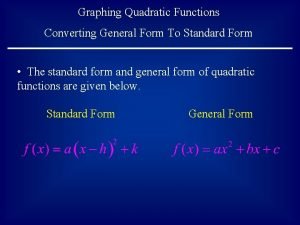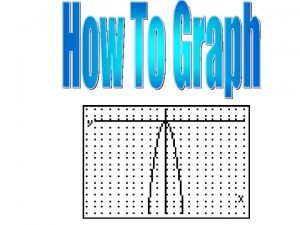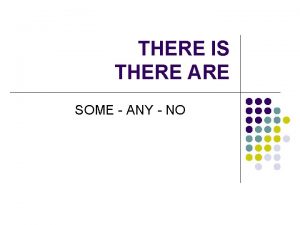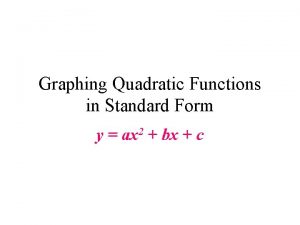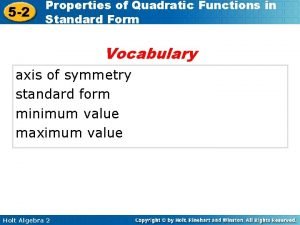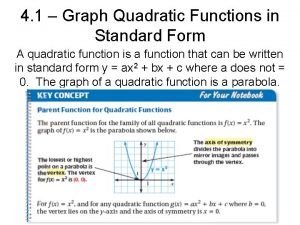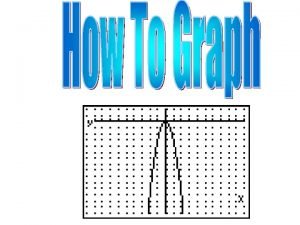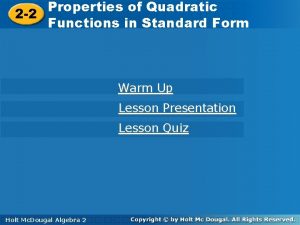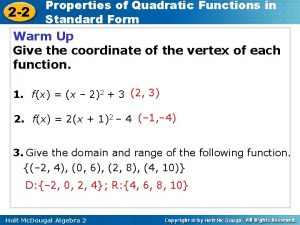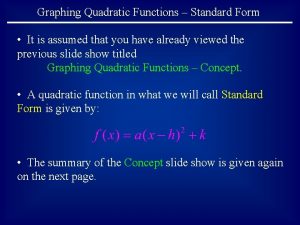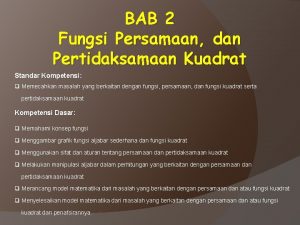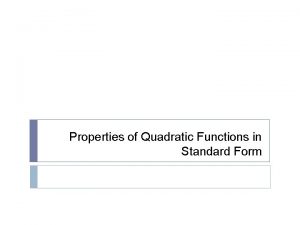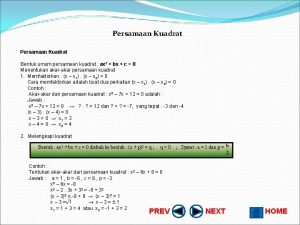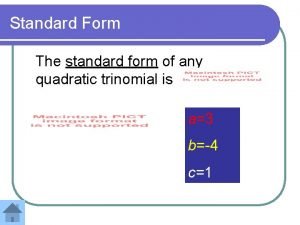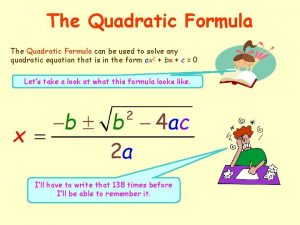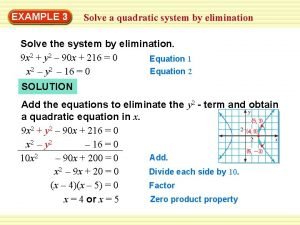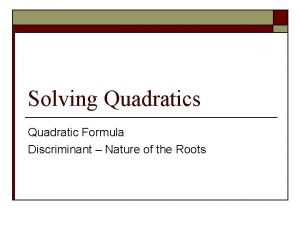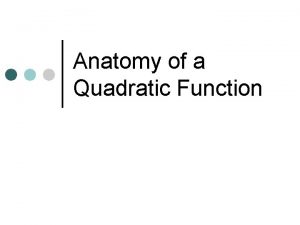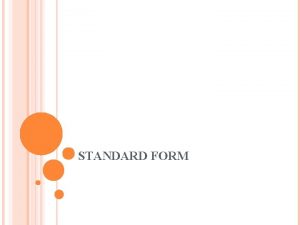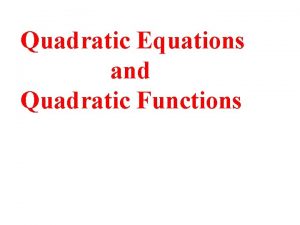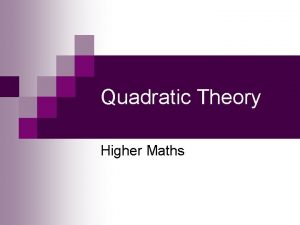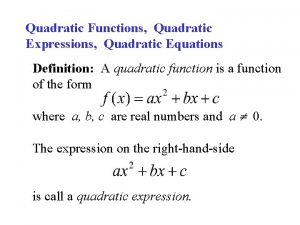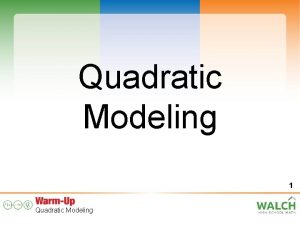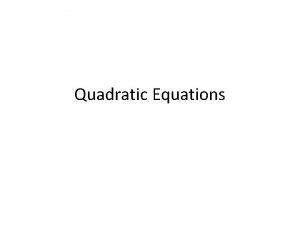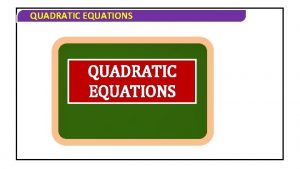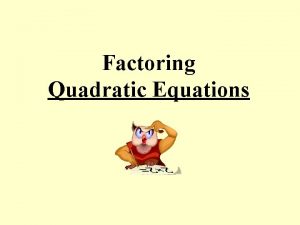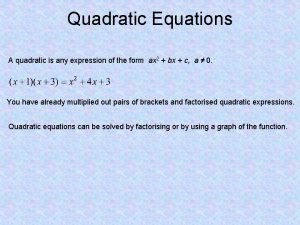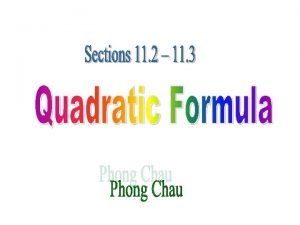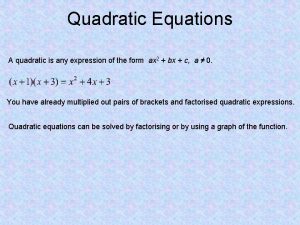Standard Form The standard form of any quadratic























- Slides: 23

Standard Form The standard form of any quadratic trinomial is a=3 b=-4 c=1

Now you try. a= b= c=

Factoring when a=1 and c > 0. l First list all the factor pairs of c. l Then find the factors with a sum of l These numbers are used to make the factored expression. 1 , 12 2, 6 3, 4 b

Now you try. Factors of c: Circle the factors of c with the sum of b Binomial Factors ( )( Binomial Factors ) ( )( )

Factoring when c >0 and b < 0. lc is positive and b is negative. l Since a negative number times a negative number produces a positive answer, we can use the same method as before but… l The binomial factors will have subtraction instead of addition.

Let’s look at First list the factors of 12 1 12 We need a sum of -13 2 6 3 4 Make sure both values are negative!

Now you try.

Factoring when c < 0. We still look for the factors of c. However, in this case, one factor should be positive and the other negative in order to get a negative value for c Remember that the only way we can multiply two numbers and come up with a negative answer, is if one is number is positive and the other is negative!

Let’s look at In this case, one factor should be positive and the 1 other negative. 2 We need a sum of -1 + 3 12 6 - 4

Another Example List the factors of 18. We need a sum of 3 1 18 What factors and signs will we use? 2 9 3 6

Now you try. 1. 2. 3. 4.

Prime Trinomials Sometimes you will find a quadratic trinomial that is not factorable. You will know this when you cannot get b from the list of factors. When you encounter this write not factorable or prime.

Here is an example… 1 18 2 9 3 6 Since none of the pairs adds to 3, this trinomial is prime.

Now you try. factorable prime

When a ≠ 1. Instead of finding the factors of c: Multiply a times c. Then find the factors of this product. 1 70 2 35 5 14 7 10

We still determine the factors that add to b. 1 70 2 35 5 14 7 10 So now we have But we’re not finished yet….

Since we multiplied in the beginning, we need to divide in the end. Divide each constant by a. Simplify, if possible. Clear the fraction in each binomial factor

Recall • Multiply a times c. • List factors. Look for sum of b • Write 2 binomials using the factors with sum of b • Divide each constant by a. • Simplify, if possible. • Clear the fractions.

Now you try.

Sometimes there is a GCF. If so, factor it out first. Then use the previous methods to factor the trinomial

Now you try. 1. 2.

Recall First factor out the GCF. Then factor the remaining trinomial.

1. 2.
 4-2 standard form of a quadratic function
4-2 standard form of a quadratic function How to convert general form to standard form quadratic
How to convert general form to standard form quadratic Standard form of quadratic equation
Standard form of quadratic equation There is some cake
There is some cake Any to any connectivity
Any to any connectivity Seknder
Seknder Evaluate radicals calculator
Evaluate radicals calculator Quadratic function properties
Quadratic function properties Vertex form
Vertex form Properties of quadratic function
Properties of quadratic function Standard form from graph
Standard form from graph Standard form quadratic equation
Standard form quadratic equation Standard form of quadratic function
Standard form of quadratic function Properties of quadratic functions
Properties of quadratic functions Properties of quadratic functions in standard form
Properties of quadratic functions in standard form How to graph quadratic functions in standard form
How to graph quadratic functions in standard form Persamaan dan pertidaksamaan kuadrat
Persamaan dan pertidaksamaan kuadrat How to find a in vertex form
How to find a in vertex form Bentuk umum kuadrat
Bentuk umum kuadrat Standard trinomial form
Standard trinomial form The quadratic formula can be used to
The quadratic formula can be used to How to solve quadratic equations by elimination
How to solve quadratic equations by elimination Quardratic formula
Quardratic formula Hình ảnh bộ gõ cơ thể búng tay
Hình ảnh bộ gõ cơ thể búng tay

